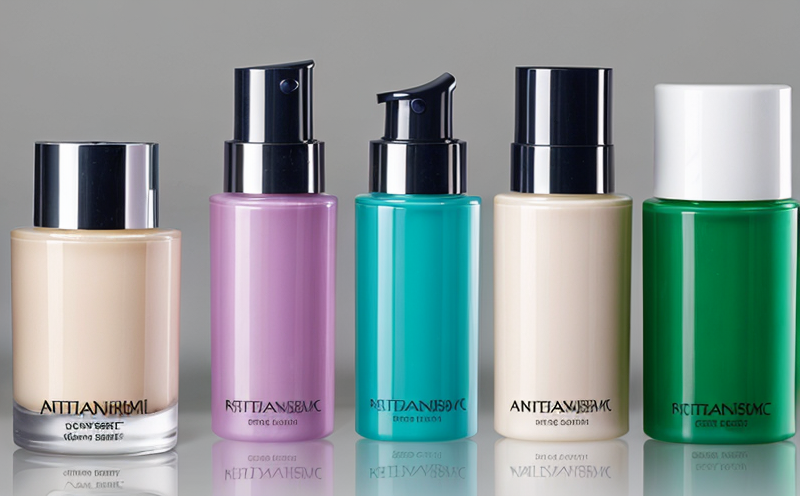Challenge Testing of Preservatives in Cosmetic Formulations
The challenge testing of preservatives in cosmetic formulations is a critical step in ensuring product safety and effectiveness. This service involves exposing formulated products to known microbial contaminants under controlled conditions, which allows for the evaluation of the preservative's efficacy. The goal is to determine whether the preservative can effectively inhibit or eliminate the growth of microorganisms that might otherwise contaminate the product.
Preservatives play a crucial role in extending the shelf life and ensuring the quality of cosmetic products by preventing spoilage due to microbial contamination. In this context, challenge testing provides empirical evidence regarding the performance of preservatives against specific microorganisms. This is particularly important given the increasing demand for natural and synthetic preservatives that are both effective and safe.
During challenge testing, a variety of microorganisms are introduced into the cosmetic formulation in controlled conditions to simulate real-world scenarios. The efficacy of the preservative is then evaluated over a specified period based on the growth or survival rate of these contaminants. This process ensures that the product meets regulatory requirements and maintains its quality throughout its shelf life.
The testing protocol adheres to international standards such as ISO 22716:2011, which provides guidelines for personal care products, including the use of preservatives. Compliance with these standards is essential for ensuring consistency in testing methodologies across different laboratories and jurisdictions.
For quality managers and compliance officers, this service offers a comprehensive assessment tool to ensure that their formulations meet regulatory requirements. R&D engineers can utilize challenge testing results to refine formulation design and ingredient selection, while procurement teams benefit from validated data supporting the efficacy of preservatives sourced by suppliers.
The significance of challenge testing cannot be overstated in today's competitive market where consumer safety and product quality are paramount. By incorporating this service into their quality assurance processes, companies can enhance their reputation for producing safe and high-quality cosmetic products, thereby fostering customer trust and satisfaction.
Why It Matters
The importance of challenge testing in the context of preservatives cannot be overstated. Regulatory bodies worldwide recognize that microbial contamination poses a significant risk to consumer health and product integrity. The European Union's Cosmetics Regulation (EC) No 1272/2008, for instance, emphasizes the need for effective preservation systems to prevent the growth of microorganisms in cosmetic products.
By conducting challenge testing, companies can demonstrate their commitment to maintaining product safety and efficacy throughout the shelf life. This not only ensures compliance with regulatory standards but also helps build a strong brand reputation among consumers who are increasingly aware of and concerned about the quality and safety of personal care products they use daily.
The results from these tests provide valuable insights into the performance of preservatives under real-world conditions, which is crucial for optimizing product formulations. This data can inform ongoing research and development efforts to improve product stability, extend shelf life, and enhance overall consumer satisfaction.
Customer Impact and Satisfaction
The impact of effective challenge testing extends beyond regulatory compliance; it significantly enhances customer confidence and satisfaction. Consumers today are more informed and discerning about the products they use, particularly when it comes to personal care items that come into direct contact with their skin and hair.
By ensuring that preservatives in cosmetic formulations meet rigorous standards through challenge testing, companies can provide consumers with peace of mind knowing that their products are safe from microbial contamination. This commitment to quality not only fosters trust but also encourages repeat purchases and positive word-of-mouth recommendations.
In addition to enhancing consumer confidence, effective challenge testing also contributes to reducing the incidence of product recalls and associated costs. A recall can have severe financial repercussions for a company, as well as damage its reputation. By proactively addressing potential issues through comprehensive testing, companies can minimize these risks and focus on delivering high-quality products.
Moreover, customer satisfaction is directly linked to perceived value. When consumers feel that their purchased products are safe and effective, they are more likely to recommend the product to others, thereby expanding brand loyalty. This positive feedback loop strengthens the company's market position and enhances its long-term sustainability.
International Acceptance and Recognition
The global nature of the cosmetics industry necessitates uniform standards for quality assurance, including the challenge testing of preservatives. International acceptance and recognition of this service underscore its importance in maintaining high-quality standards across borders.
Compliance with international standards such as ISO 22716:2011 ensures that laboratories adhere to best practices, which is essential for maintaining credibility and trust among regulatory bodies worldwide. The European Union's Cosmetics Regulation (EC) No 1272/2008 also mandates the use of preservatives that have been proven effective through rigorous testing.
Recognition from respected organizations further enhances the credibility of this service. For instance, the Good Laboratory Practice (GLP) certification ensures that laboratories meet stringent quality control and assurance criteria. This certification is widely recognized in the industry and demonstrates a commitment to excellence in laboratory operations.
The global acceptance of challenge testing also facilitates smoother international trade by ensuring that products meet the standards required by importing countries. This alignment with international norms not only simplifies compliance processes but also opens up new markets for companies willing to adhere to these stringent requirements.





